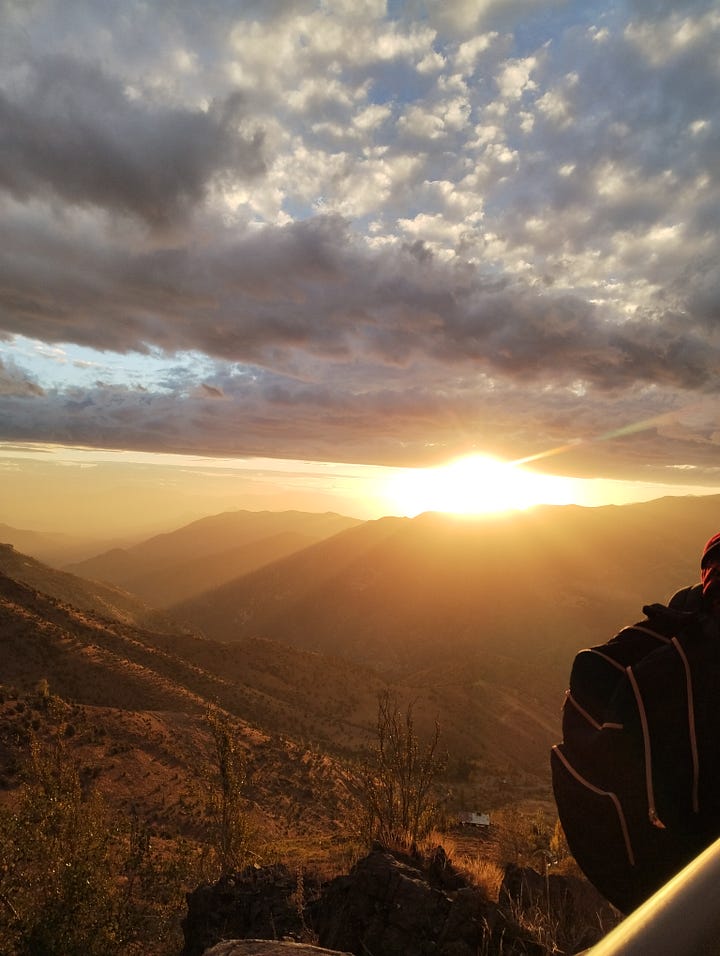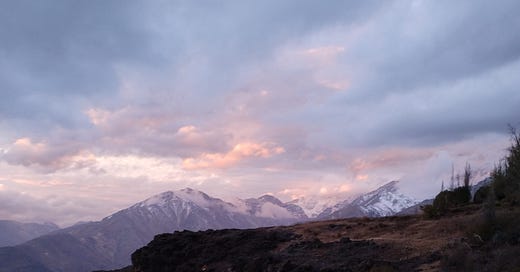For a long time, I have been against tourism in this newsletter and fiercely defended the local experience that a nomadic life provides. I want to make a mea culpa in this edition of No Direction Home. This text is an ode to tourism.
Recently, in Santiago, Chile, I had an authentic tourist experience in the Andes. The van picked us up one by one at the hotels and Airbnbs. Each couple or family that got in was more touristy than the last. The agency responsible for the tour was Brazilian, the guide was Brazilian, all the tourists were Brazilian, the language spoken was Portuguese, and even the music played along the way were Brazilian classics. Except for the Andes scenery, I felt like I was in Brazil.
It's not easy to explore the Andes on your own. The previous week, I even went to San José del Maipo by intercity bus, which was somewhat tiring. There was no such option for Valle Nevado (or if there was, I didn't look for it). I wanted a comfortable experience that would take me as close to the snow without thinking about anything. I delved into the tourist mode.
First, how amazing it is to have a van pick you up and drop you off at home. You don't have to worry about public transport, schedules, Uber prices, or how to get to places. The van driver was responsible for that. My only concern was to enjoy the scenery.
The guide was a 30-year-old Brazilian living in Chile for almost 10 years, making him forget some Portuguese words and have a strange accent. But what a fun, friendly, and lively guy he was, precisely what you expect from a guide. He gave us information about the Andes, Chile, and the snow along the way. He told jokes, promoted socialization among about 20 people, and answered all our questions. In the end, he thanked the vibrancy of our group, which undoubtedly existed only because of his vibrancy.
In the deep curves of the Andes, we saw a car almost lose control. The guide told us it was probably a tourist with a rental car and no experience on this type of road. The van driver had over 30 years of experience on this winding road. Sometimes, it's good to outsource the local experience.
Valle Nevado is a tourist spot made for people with money and expensive hotel rates. I went there only for a few hours in search of snow, which unfortunately only arrived five days after my visit —although it was not yet the season, the climate crisis has brought snow earlier and more intensely. However, it was a pleasurable experience to have hot chocolate in a French restaurant with a view of snowy mountains.
The highlight of the tour, nevertheless, was the sunset with drinks, snacks, and even a mini-party at the travel agency's leisure house, located strategically on a curve in the Andes. Several vans gathered, resulting in 90 Brazilians —a nightmare for those who hate tourists.
I must admit, however, that it was fun. We were welcomed by the agency's owner, a 39-year-old Brazilian who had the enthusiasm of our guide. Everyone loosened up after the first glass of wine, and the groups interacted more. Suddenly, the agency's owner bottlenecked a local drink for each of the 90 Brazilians. "Wow, wow, wow", a very Brazilian mess. For a few hours, the Andes were ours, and I feared a diplomatic crisis in this enclave.
The sunset was formidable. On one side, snowy mountains with pinkish rays of light, and on the other, very orange between the gaps of different mountains. The DJ played more Brazilian music classics to make us feel even more at home. The agency owner took over the dance floor with lights and pyrotechnic effects, and people danced wildly to Brazilian funk music. What a day.


On the way back, there was less interaction. Everyone was tired after a full day. By 9 pm, I was already in my Airbnb. It was worth every 75 dollars I spent on this tourist trip.
Am I getting old and just wanting comfort? Am I tired of the unpredictable life of nomadism and its local experiences? The answer can be broad. Traveling is about opening yourself to the different, including occasionally doing something more traditional.
By the way, the traditional is relative. Nomads and professional travelers might find much of my day in the Andes cliché. And it indeed is. But it doesn't take away the courage of people being outside their natural habitats, exploring another country. It's an adventure, limited in many aspects, but the most that many people there can do.
It was strange for me to spend an entire day alongside Brazilians and only interact in Spanish with the restaurant waitress. But this security ensured the presence of many people. Tourism is an industry because there is this demand. I will continue to want the most local life possible, but it's inconceivable for millions of people to have only experiences like a local. It's nice that there are both possibilities.
From now on, I will be less intolerant when I need a day of traditional tourism, even though I hope this newsletter continues to encourage those seeking a less conventional way of life.
Bon voyage to all.






I think that sometimes doing these touristy tours is ok, if they are well organized it can be fun and interesting. Thank you for the article!
I enjoyed this perspective, Mateus. Especially in places where people are employed in the tourism industry and have studied and worked at it for decades. I think it makes sense to support these local leaders and agencies. They will have so much more knowledge and experience of a region than us “nomads” with our guidebooks and blog posts we read a few days before visiting. I’m never a fan of overtourism, but I think there is a lot to be said for supporting local guides and organizations. And of course, pay people fairly and tip well.